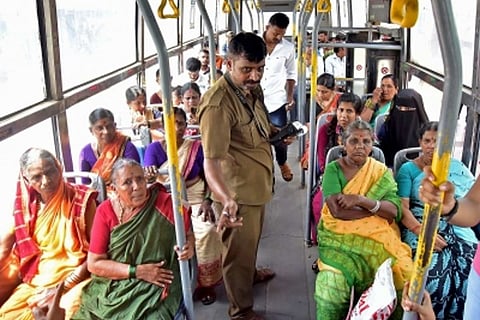

Follow TNM’s WhatsApp channel for news updates and story links.
A recent multi-city study has revealed a stark gap in gender inclusivity across public transport systems, both among commuters and in the workforce. Women commuters who participated in the survey reported persistent concerns around safety, overcrowding, and poor service reliability. While 30% of women reported harassment or theft, 41% said overcrowding made their journeys uncomfortable and unsafe.
The report by Institute for Transportation and Development Policy (ITDP) India and the Deutsche Gesellschaft für Internationale Zusammenarbeit (GIZ) GmbH, titled “Gender Inclusivity in India’s Public Transport,” was released in November under the Indo-German SUM-ACA programme, commissioned by the German Federal Ministry for Economic Cooperation and Development (BMZ).
Researchers analysed gender-specific quantitative insights from the Transport4All Challenge conducted in 46 cities. Of over 2,00,000 responses, 78,000 were from women commuters, revealing persistent concerns around safety, overcrowding, and poor service reliability. Complementing the survey data, focus group discussions were held with 74 women members of staff from multiple State Transport Undertakings (STUs). The report provides qualitative insights from Pune, Chennai, Bengaluru, and Delhi.
Notably, 30% of women reported experiencing harassment or theft, while 41% said overcrowding made their journeys uncomfortable and unsafe. Additionally, 32% cited long waiting and journey times, often leading to anxiety and unsafe travel conditions.
The study also revealed that 24% women commuters expressed willingness to shift to public transport for most trips if conditions improved.
Also Read: Nagarada Shakti: Bengaluru’s city bus that added more women to the workforce
Women in the workforce
Women make up less than 1% of the workforce in public transport systems.
According to data collected by the Association of State Road Transport Undertakings (ASRTU), it has been established that only 0.16% of driver positions and a mere 15% of conductor roles in public transport operations are held by women nationwide. These women face issues ranging from a lack of resting spaces at bus depots to harassment on buses.
A recent article titled “Decolonial interventions and rethinking normativity: Towards alternative paradigms of feminist knowledge and power”, by Pallavi Bansal, highlights how design choices for ride-hailing platforms are not conducive to both genders. They overlook the safety requirements of women drivers, such as an SOS button.
ITDP India’s managing director Aswathy Dilip stressed the need to improve women’s participation in the public transport workforce. “Women users form the majority of public transport ridership. In fact, the 2011 Census states that 84% of trips taken by women for work in urban India were by public transport, whereas for men it was 71%. Having more women in operations will ensure services are more responsive to their needs,” she said.
Also Read: Karnataka Shakti Scheme led to sustained rise in women taking bus rides: Study
Recommendations
The report draws out seven actionable recommendations and an implementation plan, which include 50% women workforce participation, establishing anti-discrimination and redressal cells, improving lighting standards at terminals, deploying 40–60 buses per lakh population, and mandating low-floor buses for better accessibility. Routine gender sensitisation for staff and commuters is also proposed.
Kashmira Dubash, deputy director of ITDP India, emphasised that men and women were working in or using public transport, not because of the infrastructure provided, but despite the infrastructure provided for them. She calls for urgent change.